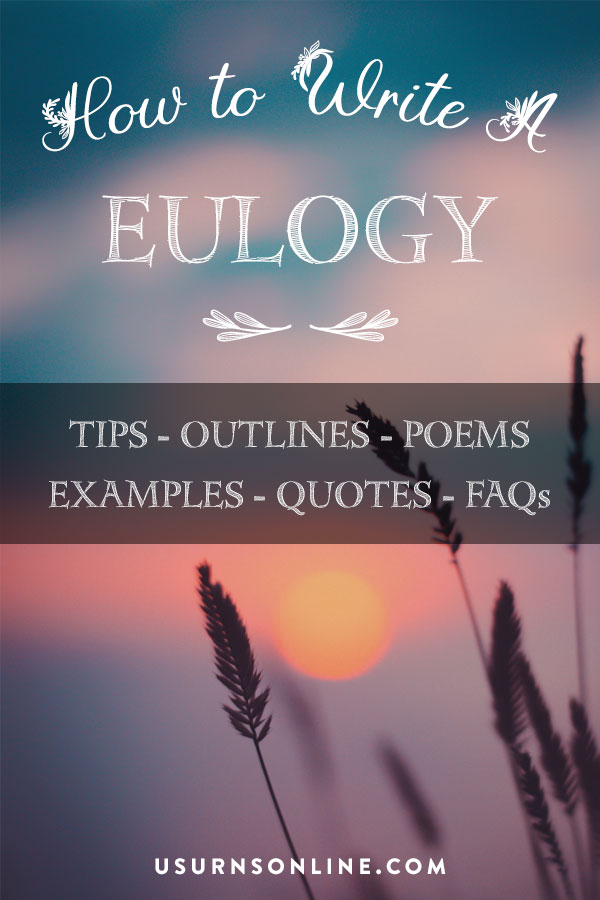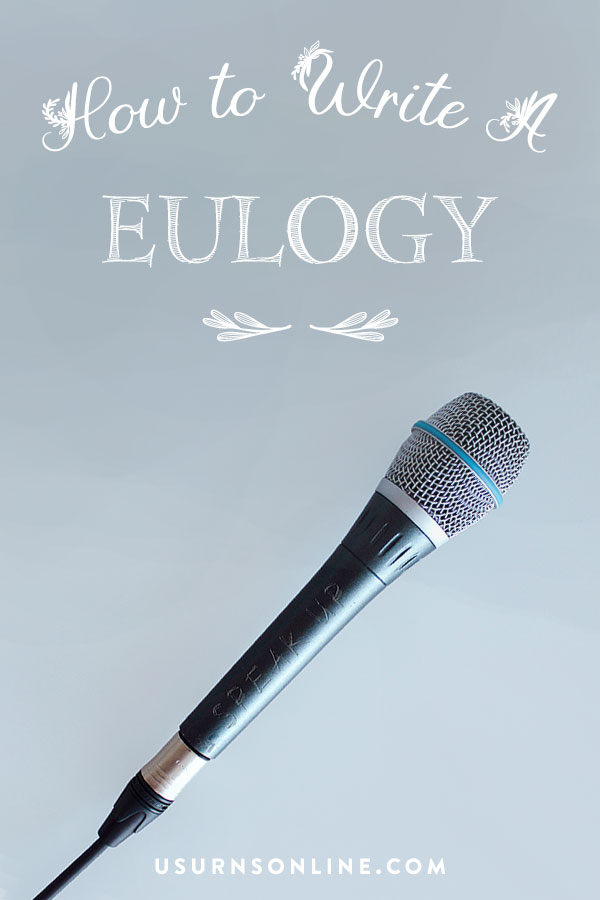I’m a professional writer with a eulogy writing business. In this article, I’m going to show you the exact process I use to write my eulogies.
The eulogy is a funeral speech that commemorates the life of a departed loved one. It’s an important feature in the funeral service, often the central event.
It is a high honor to be chosen to give the eulogy, and I’m glad you’re seeking advice on how to do it well.
Here is my guide on how to write a eulogy that is beautiful, brief, appropriate, and winsome.
How to Write a Eulogy
A eulogy is a formal speech given at a funeral that honors the life and memory of someone who has died.
The eulogy
- Chronicles their life,
- Showcases their accomplishments,
- Illustrates their personality, and
- Pays tribute to their legacy.
All this is done with dignity, grace, and a fitting sense of humor. The goal is to uphold the legacy they leave for family and friends in words that everyone can remember and treasure.
Let’s take a look at how to write a good eulogy.
Step 1: Choose the Tone
Do you want your eulogy to be serious, religious, or even slightly humorous?
To help you decide, consider your audience and also the person who has died. For instance, the eulogy for a young child may be very different than that of an elderly person who have passed away under completely different circumstances.
Urns Made in the USA
Start with a tone that is respectful and compassionate, then add in humor and solemnity as the story of their life unfolds.
Step 2: Introduce Yourself
Of course you’ll want your audience to know who you are, how you know or are related to the deceased, a little about your relationship with the person. But keep it brief – it’s not about you.
Step 3: Provide a Biographical Sketch
It should be thorough yet brief. The bio should include their date and place of birth, any family members and friends, where they grew up, graduated from, married, etc. It can also include their date of death. But remember: don’t get bogged down with too many details!
Step 4: Add in Some Favorite Memories
This is where you can get into a little more detail than in the biographical sketch. What is your favorite memory of your loved one? A good story or two can help provide the color and life to your eulogy.
Write about what made them who they were. These stories and memories will make up the bulk of your eulogy.
If you don’t have any suitable stories of your own, you can also collect any stories about your loved from family and friends. Anyone who created special memories with your loved one would no doubt like their stories represented in the eulogy.
Step 5: Organize Your Material
For many people, this is the hardest part of writing a quality eulogy. To keep it “sweet and simple,” simply put the stories and memories you’ve written down in chronological order. This will make it easier for your audience to follow.
If you have a lot of stories and memories, the best way to narrow it down is to choose a common theme.
Here’s an example. Perhaps you’ll realize that there are a lot of stories that show your loved one’s kindness. Developing this as the theme, choose one story of kindness that is funny, one that is tenderhearted or even sad, and one that is either well-known by everyone or completely unknown.
Step 6: Mix in Some Gratitude
Showing gratitude for everyone who came to the funeral is always a nice gesture.
Remember, too, to thank everyone who has offered support throughout the past several days, as well as the church, funeral home, hospice center, and so on.
Lastly, be sure to acknowledge that these supporters and many of those attending the funeral are in the process of grieving. This validates their sorrow and unifies everyone in their collective grief.
Step 7: Closing & Goodbye
This will mark the end of your eulogy. It may be the most emotional moment of your eulogy, so it will help to prepare for it by practicing saying it out loud.
If you have made it this far and are still feeling overwhelmed over the thought of writing your eulogy, stop right now and just tell yourself, I can do this! Confidence is key and once you believe you can do it, you are already halfway there.
But when life, being life, intersects with death, things can quickly get overwhelming. If you are sure that you can’t tackle your eulogy right now, bear in mind that help is available.
You can ask a close friend or family member to help you, or you can even hire me. It is what I do for a living, after all.
Tips for Writing a Beautiful Eulogy
Keep it short. Eulogies should be brief, poignant, and summarize the individual’s life without going into every detail. It should be approximately 1000 words and take around 6-8 minutes to deliver.
Be authentic, but focus on the positive. A good eulogy can admit the person’s faults but will typically emphasize their strengths. Be sure to mention your loved one’s major accomplishments (personal and vocational), spouse and children (if any), hobbies, passions, religion, and volunteer work.
Think of their best stories and attributes. Start with a favorite story or memory, and connect that to one of the person’s defining characteristics. Or, alternatively, do the reverse: think of their most important attributes and then think of memories or quotes which illustrate the attributes you want to highlight. This simple process will give you at least half of your material; from there, just find a good eulogy outline and begin filling it in.
Consider a theme. Use a central story, phrase, or quote as a motif. Remember, there’s no way you can fully sum up a person’s life in a short funeral speech. Highlight their best characteristics by using a story or phrase that captures several aspects of their life and personality.
Don’t get bogged down in details. Of course, you’ll want to briefly summarize the person’s family, accomplishments, and legacy. But avoid making the entire eulogy a list of people, places, and events. Focus on their personality and how they affected the lives of others.
Less is more. You’ll be surprised at how much you end up wanting to say. Remove unnecessary details and keep it to 1-2 short stories.
Write it out. Unless you’re an experience public speaker, don’t rely on notes or a bare outline. Write out each word you want to say.
Practice. Print out a completed copy of your speech before the funeral. Use a large and readable font with double spacing. Practice reading it aloud to make sure the sentences flow. Do this in front of a mirror or a family member, and time yourself from start to finish.
Slow down and speak clearly. You’ll be tempted to read the speech quickly. Practice speaking in a slow and clear voice, and be sure to enunciate your words properly. Pause occasionally. Right before it’s time to stand up and deliver your eulogy, take a few deep breaths. You’ve got this.
Eulogy Outline
There is no set outline or traditional template for a eulogy. But as with all writing and public speaking, it is good to have an attention-grabbing opening, a solid middle section in three parts, and some concluding remarks.
This is the traditional three-point outline you learned in school, and it will serve you well in writing a eulogy.
Introduction
- A good introduction can include a funny or engaging story, a meaningful quote, or something that illustrates their personality
- Use the introduction to establish a motif (a theme that you can come back to throughout the eulogy)
- Mention your relationship to the deceased and thank everyone for coming on behalf of the family
- Aim for one to two minutes
Part One: Life Details
- Keep this section brief; one minute at most
- Include just the highlights; some but not all of: Place of birth, family lineage, education, work, marriage, children, hobbies, religion, community involvement, awards, accomplishments, places lived, travel
- Don’t include everything; this will make your speech dry and boring
Part Two: Memories
- Share a memory or two that allows one or more characteristics of the person to shine; something that will resonate with anyone who knew them
- Allow a good two minutes or so to properly share some memories
- Aim for 2 or 3 stories
Part Three: Legacy
- Connect the theme you’ve developed in the stories, memories, and introduction
- This is what you want to highlight as their legacy
- Instead of saying, “She was loving, caring, and kind,” show how she was loving, caring and kind
- This doesn’t need to be long; one minute is perfectly fine
Closing
- As with the introduction, it is good to close with a story, quote, or illustration
- Your closing remarks can be between ten seconds to a minute; just a few brief sentences to wrap things up
- Consider saying “goodbye” to your loved one
- End by simply saying “Thank you”
Here is a free downloadable fill-in-the-blank eulogy template along with a more detailed outline to help you shape your speech.
Eulogy Quotes and Inspiration
- 20 Funeral Quotes for a Loved One’s Eulogy
- 33 Inspiring Life Celebration Quotes
- 10 Biblical Prayers for a Christian Memorial Service
- Missing You: 22 Honest Quotes About Grief
- Scripture Quotes for Eulogies
Eulogy Examples
There are many eulogy examples available on the web. I think you’ll find the best inspiration on writing a eulogy by looking at a few general examples and then also reading a few famous and timeless eulogy examples.
- Lydia: Eulogy example for mother
- Edwin: Eulogy example for father
- Laura: Eulogy example for grandmother
- McKayla: Eulogy example for cousin
I’ve included some of my own sample eulogies at the links above. Read them to see how I practice these tips. Here are some more examples I’ve written, and next you’ll see some famous eulogies you can read for inspiration.
Famous Eulogies
- President Reagan’s Eulogy for the Challenger 7 crew
- Oprah Winfrey’s Eulogy for Rosa Parks
- Bob Costas’ Eulogy for Stan Musial
- In Memory of Y.B. Yeats by W.H. Auden (poem)
Eulogy Writing Prompts
Use these questions and prompts to get started.
- Share an example of wisdom you learned from the deceased
- What was his or her “essence” – their defining characteristic?
- Note down a timeline of their significant life moments. What are the most important things to share?
- If you were looking through their old photo albums, what would you see?
- What was their favorite song lyric, and why?
- What is your favorite memory of the individual?
Next, we have some great tips for you on how to avoid crying during the eulogy speech.






I am writing the Eulogy for my Dad and came across this website. It helped me so very much as I didn’t have a clue where to start. So very helpful.. Thank you so very much!
Very helpful and thorough guidance with just the right amount of adaptable examples which allow personalisation.
I am so pleased that this website is easily available and refreshingly, does not try to take financial advantage at such a difficult time.
Very helpful and thorough guidance with just the right amount of adaptable examples which allow personalisation.
I am so pleased that this website is easily available and refreshingly, does not try to take financial advantage at such a difficult time.
thank you for taking the time to write this, it is a big help at a tough time. warm regards Damin – New Zealand
Thank you for your information! It has helped immensely with writing my mother’s eulogy!